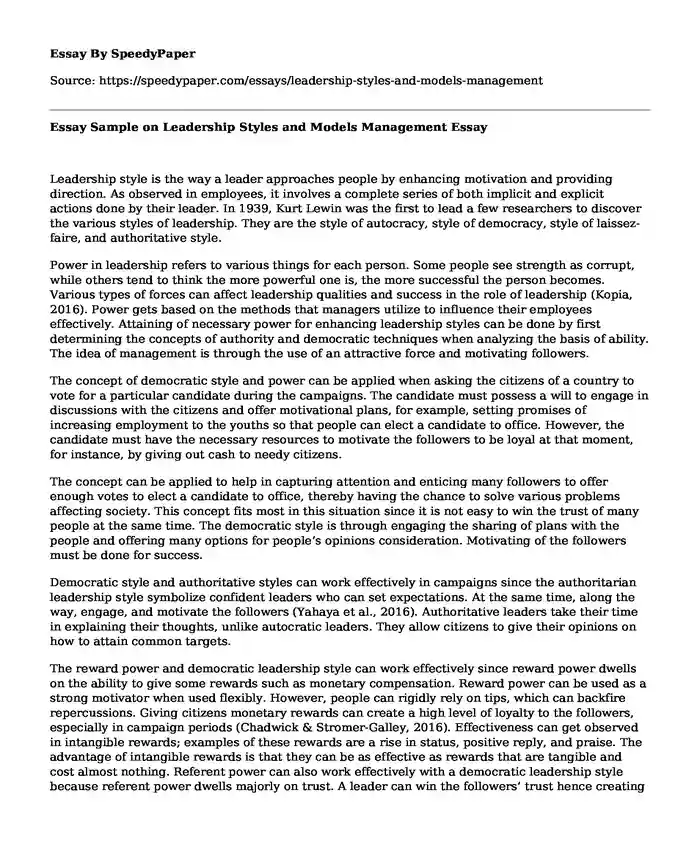
| Essay type: | Definition essays |
| Categories: | Human resources Motivation Leadership style Leadership management |
| Pages: | 3 |
| Wordcount: | 621 words |
Leadership style is the way a leader approaches people by enhancing motivation and providing direction. As observed in employees, it involves a complete series of both implicit and explicit actions done by their leader. In 1939, Kurt Lewin was the first to lead a few researchers to discover the various styles of leadership. They are the style of autocracy, style of democracy, style of laissez-faire, and authoritative style.
Power in leadership refers to various things for each person. Some people see strength as corrupt, while others tend to think the more powerful one is, the more successful the person becomes. Various types of forces can affect leadership qualities and success in the role of leadership (Kopia, 2016). Power gets based on the methods that managers utilize to influence their employees effectively. Attaining of necessary power for enhancing leadership styles can be done by first determining the concepts of authority and democratic techniques when analyzing the basis of ability. The idea of management is through the use of an attractive force and motivating followers.
The concept of democratic style and power can be applied when asking the citizens of a country to vote for a particular candidate during the campaigns. The candidate must possess a will to engage in discussions with the citizens and offer motivational plans, for example, setting promises of increasing employment to the youths so that people can elect a candidate to office. However, the candidate must have the necessary resources to motivate the followers to be loyal at that moment, for instance, by giving out cash to needy citizens.
The concept can be applied to help in capturing attention and enticing many followers to offer enough votes to elect a candidate to office, thereby having the chance to solve various problems affecting society. This concept fits most in this situation since it is not easy to win the trust of many people at the same time. The democratic style is through engaging the sharing of plans with the people and offering many options for people’s opinions consideration. Motivating of the followers must be done for success.
Democratic style and authoritative styles can work effectively in campaigns since the authoritarian leadership style symbolize confident leaders who can set expectations. At the same time, along the way, engage, and motivate the followers (Yahaya et al., 2016). Authoritative leaders take their time in explaining their thoughts, unlike autocratic leaders. They allow citizens to give their opinions on how to attain common targets.
The reward power and democratic leadership style can work effectively since reward power dwells on the ability to give some rewards such as monetary compensation. Reward power can be used as a strong motivator when used flexibly. However, people can rigidly rely on tips, which can backfire repercussions. Giving citizens monetary rewards can create a high level of loyalty to the followers, especially in campaign periods (Chadwick & Stromer-Galley, 2016). Effectiveness can get observed in intangible rewards; examples of these rewards are a rise in status, positive reply, and praise. The advantage of intangible rewards is that they can be as effective as rewards that are tangible and cost almost nothing. Referent power can also work effectively with a democratic leadership style because referent power dwells majorly on trust. A leader can win the followers’ trust hence creating strong, loyal coherence.
References
Chadwick, A., & Stromer-Galley, J. (2016). Digital media, power, and democracy in parties and election campaigns: Party decline or party renewal?
Kopia, J. (2016, April). Study on integration and leadership styles of Management Systems based on a high-level structure. In International Conference on Management, Leadership & Governance (p. 431). Academic Conferences International Limited.
Yahaya, Rusliza, and Fawzy Ebrahim. "Leadership styles and organizational commitment: A literature review." Journal of Management Development (2016).
Cite this page
Essay Sample on Leadership Styles and Models Management. (2023, Aug 01). Retrieved from https://speedypaper.net/essays/leadership-styles-and-models-management
Request Removal
If you are the original author of this essay and no longer wish to have it published on the SpeedyPaper website, please click below to request its removal:
- A Moment Remembered - Personal Essay Sample
- Essay Sample on Women in Prison: Who Takes Care of the Children?
- Internal Communication Systems within an Organization - Free Essay with Research Proposal
- Organizational Change in Shell Oil Company, Free Essay in Management
- Paper Example on Security Risk Assessment Scheduling
- Essay Sample on Self-Psychology Theory
- Interview Questions and Answers - Free Essay
Popular categories




